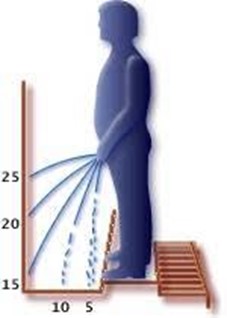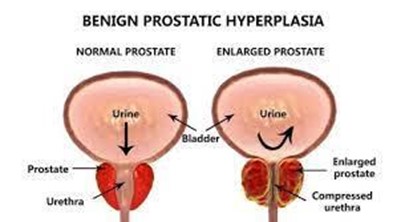A nurse is caring for a client who has benign prostatic hyperplasia (BPH). Which of the following findings should the nurse expect?
Painful urination
Decreased urinary stream
Critically elevated prostate-specific antigen (PSA) level
Urge incontinence
The Correct Answer is B
Choice A Reason: Painful urination is not a common finding in BPH, but it may indicate a urinary tract infection or bladder stones.
Choice B Reason: Decreased urinary stream is a common finding in BPH, as the enlarged prostate compresses the urethra and obstructs the flow of urine.
Choice C Reason: Critically elevated PSA level is not a common finding in BPH, but it may indicate prostate cancer or prostatitis.
Choice D Reason: Urge incontinence is not a common finding in BPH, but it may indicate an overactive bladder or neurogenic bladder.


Nursing Test Bank
Naxlex Comprehensive Predictor Exams
Related Questions
Correct Answer is D
Explanation
Choice A Reason: N0 does not indicate presence of regional lymph node involvement, but absence of it. N1 to N3 indicate increasing degrees of regional lymph node involvement.
Choice B Reason: TIS does not indicate that a tumor has been resolved, but that it is in situ, meaning that it is confined to the original site and has not invaded deeper tissues.
Choice C Reason: T4 does not indicate a tumor at its smallest size, but at its largest size. T1 to T4 indicate increasing sizes or extents of the primary tumor.
Choice D Reason: M1 indicates tumor metastasis to a single site, meaning that the cancer has spread to another organ or distant lymph node. M0 indicates no distant metastasis.
Correct Answer is A
Explanation
Choice A Reason: Contacting the health care provider is the first nursing action that the nurse should perform, as it indicates that the client may have compartment syndrome, which is a medical emergency that requires immediate intervention to prevent tissue necrosis and nerve damage.
Choice B Reason: Administering PRN pain medication is not the first nursing action that the nurse should perform, as it may not relieve the pain and may mask the symptoms of compartment syndrome.
Choice C Reason: Documenting the findings is not the first nursing action that the nurse should perform, as it may delay the treatment and worsen the outcome of compartment syndrome.
Choice D Reason: Elevating the extremity is not the first nursing action that the nurse should perform, as it may decrease blood flow and increase tissue ischemia in compartment syndrome.
Whether you are a student looking to ace your exams or a practicing nurse seeking to enhance your expertise , our nursing education contents will empower you with the confidence and competence to make a difference in the lives of patients and become a respected leader in the healthcare field.
Visit Naxlex, invest in your future and unlock endless possibilities with our unparalleled nursing education contents today
Report Wrong Answer on the Current Question
Do you disagree with the answer? If yes, what is your expected answer? Explain.
Kindly be descriptive with the issue you are facing.
